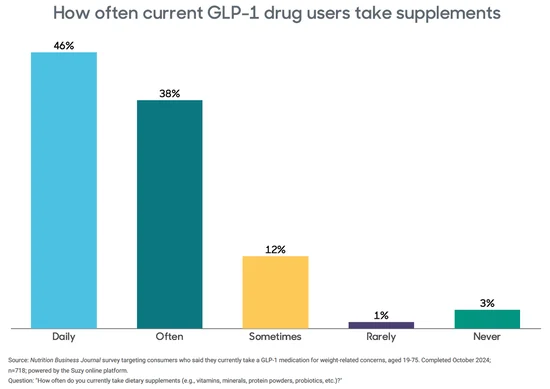- Home
- Education & Insights
- Search
- The Ripple Effect. The Changing Face of Nutritional Supplements in a GLP-1 World
The Ripple Effect. The Changing Face of Nutritional Supplements in a GLP-1 World

Table of contents
Examining the intersection of pharmaceutical innovation and dietary supplement support.
The meteoric rise of GLP-1 receptor agonists for weight loss medications such as semaglutide (Ozempic, Wegovy) and tirzepatide (Mounjaro, Zepbound) is creating a rippling transformation in both healthcare and the nutritional supplement industry. These drugs, once used mainly to manage type 2 diabetes, have become widely adopted for their ability to support significant, sustained weight loss. A RAND American Life Panel survey conducted earlier this year found that roughly 12% of the U.S. adult population reported using GLP-1 medications [1].
Beyond the scale, weight loss achieved through GLP-1 medications can lead to dramatic improvements in many obesity-related comorbidities. Studies consistently show that even moderate reductions in body weight can help lower blood pressure, improve cholesterol levels, and stabilize blood sugar, thereby reducing the risks of cardiovascular disease, type 2 diabetes, and other metabolic disorders. For many individuals, this translates to better overall health, enhanced mobility, and a renewed sense of well-being.
Since these medications have become a cultural phenomenon, the weight management supplement market has experienced a noticeable boost, and nutritional supplement companies are responding to the changing needs of GLP-1 users. According to a 2024 survey by Nutrition Business Journal (NBJ), a remarkable 96% of current GLP-1 users also incorporate supplements into their routine, with 46% taking them daily [3].

The Skinny on GLP-1 Medications
GLP-1 (glucagon-like peptide-1) receptor agonists mimic a natural hormone in the body, prompting increased insulin release. This action results in slowed digestion, more stabilized blood sugar levels, and an enhanced feeling of fullness, making these medications especially beneficial for individuals pursuing weight loss [4]. As prescriptions soar, new patient groups, including individuals without diabetes, are turning to GLP-1s. This introduces unique nutritional challenges for supplement companies.
Challenges for Patients
Typical weight loss advice focuses on balanced eating and exercise. GLP-1 medications, however, often suppress appetite so drastically that patients struggle to consume enough proteins, vitamins, and minerals [5]. Reduced food intake heightens the risk of deficiencies in nutrients like vitamin B12, vitamin D, calcium, magnesium, and iron, to name just a few [5]. The supplement market is responding with products specifically tailored for GLP-1 users including:
- Protein powders and shakes to help maintain muscle and satiety
- Multivitamins formulated for low-calorie diets
- Vitamin D and calcium blends for bone health
- Iron and B-complex supplements for energy support
- Electrolyte mixes to support hydration
As with many medications, GLP-1s are not without drawbacks, particularly when it comes to digestive issues [4]. These medications can cause nausea, indigestion, bloating and constipation. To address these issues, supplement brands are introducing:
- Ginger, peppermint, and digestive aids in capsules and chewable tablets to soothe stomach distress
- Soluble and insoluble fiber blends (such as psyllium husk and inulin)
- Prebiotics and probiotics to support digestive comfort and regularity
Digestion issues aside, there are additional side effects such as muscle loss, facial volume loss, and hair thinning [4], that the dietary supplement market is addressing. Often, specialty supplementation can offer meaningful relief and support by providing products such as those containing creatine, protein and polyunsaturated fatty acids to help preserve muscle mass [7], collagen supplements to help maintain skin elasticity, and biotin, iron and vitamin D supplements to help promote hair growth [7].
Millions of individuals are now navigating life on and after GLP-1s, facing challenges like those mentioned above and the desire to maintain weight loss without long-term reliance on prescription drugs. According to JAMA Network Open (2024), out of 125,474 adults using GLP-1 receptor agonists, 64.8% of patients without type 2 diabetes discontinued use within one year [8]. Therefore, the real nutritional supplement market opportunity may lie with patients transitioning off these medications. As costs and side effects push many to discontinue use, this emerging post-GLP-1 population is seeking sustainable solutions. Dietary supplements, known more for supporting weight maintenance than rapid weight loss, are uniquely positioned to meet this demand, making them a strategic focus for brands looking to serve a motivated and growing audience.
Let Colorcon Weigh-in
As the landscape shifts, supplement companies are pursuing innovative ways to ensure optimal nutrition for those on GLP-1 medications. This is where Colorcon pulls its weight as a trusted partner. With decades of expertise in oral pharmaceutical and nutritional supplement formulation, Colorcon enables supplement brands to design and deliver advanced vitamins and minerals tailored to the unique needs of GLP-1 users.
By leveraging Colorcon’s comprehensive portfolio of nutritional film coatings, controlled release technologies, specialized clean label excipients, and controlled atmosphere packaging solutions, supplement companies can create products that address the specific absorption and tolerability challenges encountered by individuals on appetite-suppressing medications [9]. Colorcon’s solutions include customized tablet and capsule coatings that mask taste, enhance swallowability, and protect sensitive vitamins and minerals throughout the digestive tract.
In addition, Colorcon’s formulation experts collaborate closely with brands to optimize nutrient stability and bioavailability, ensuring that essential micronutrients such as vitamin B12, vitamin D, calcium, magnesium, and iron are efficiently delivered and absorbed [10]. From innovative multi-layer tablet designs to user-friendly dosage forms, Colorcon helps bridge nutritional gaps and supports companies in creating solutions that truly benefit GLP-1 users.
To further support supplement stability and efficacy, Colorcon offers a robust selection of moisture protective desiccants and advanced packaging solutions tailored to the needs of supplement manufacturers. From silica gel packets and canisters to molecular sieve packets, these technologies are engineered to actively absorb excess moisture, safeguarding sensitive ingredients like vitamins, probiotics, and specialty actives from degradation. Colorcon also supplies Aromacan drop-in scented canisters, designed to enhance aroma and effectively mask unpleasant odors commonly associated with dietary supplements. Colorcon ensures that supplements retain their potency, shelf life, and consumer appeal, even in challenging storage environments.
Slimming the Path Forward
GLP-1s are cutting the fat (literally and figuratively) and the ripple effect is making waves from pharmacy shelves to supplement aisles. The nutritional market is responding with excitement and evolving rapidly, which requires both industries to remain adaptable, patient-focused, and committed to safety. The intersection of pharmaceutical and nutritional science is opening new doors for healthy weight management and comprehensive care. As consumers navigate appetite changes and rapid weight loss, supplement companies continue to roll out new products, educational resources, and personalized solutions to support the promising future for weight management and wellness.



